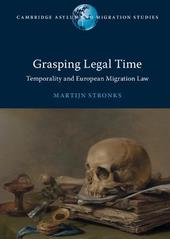
|
Grasping Legal Time: Temporality and European Migration Law
Hardback
Main Details
| Title |
Grasping Legal Time: Temporality and European Migration Law
|
| Authors and Contributors |
By (author) Martijn Stronks
|
| Series | Cambridge Asylum and Migration Studies |
|---|
| Physical Properties |
| Format:Hardback | | Pages:300 | | Dimensions(mm): Height 249,Width 176 |
|
| ISBN/Barcode |
9781108835732
|
| Classifications | Dewey:342.4082 |
|---|
| Audience | |
|---|
| Illustrations |
Worked examples or Exercises
|
|
Publishing Details |
| Publisher |
Cambridge University Press
|
| Imprint |
Cambridge University Press
|
| Publication Date |
23 June 2022 |
| Publication Country |
United Kingdom
|
Description
Time is one of the most important means for the exercise of power. In Migration Law, it is used for disciplining and controlling the presence of migrants within a certain territory through the intricate interplay of two overlapping but contradicting understandings of time - human and clock time. This book explores both the success and limitations of the usage of time for the governance of migration. The virtues of legal time can be seen at work in several temporal differentiations in migration law: differentiation based on temporality, deadlines, qualification of time and procedural differentiation. Martijn Stronks contests that, hidden in the usage of legal time in Migration Law, there is an argument for the inclusion of migrants on the basis of their right to human time. This assertion is based in the finite, irreversible and unstoppable character of human time.
Author Biography
Martijn Stronks is an Assistant Professor at the Amsterdam Centre for Migration and Refugee Law of the Vrije Universiteit Amsterdam. He studied law and philosophy at the Vrije Universiteit Amsterdam and the University of Cape Town, South Africa. His main research interests include migration and human rights law, legal philosophy, and time.
Reviews'A timely challenge to the focus on the here and now of most legal analyses, in light of cultural studies on the lived experience of individual migrants.' Daniel Thym, Chair of Public, European, and International Law, University of Konstanz 'This is an exciting book at the intersection of philosophy and migration law. It critically and carefully analyzes the role of time in the control and exclusion of migrants, and makes a strong case for jus temporis and the normative value of human time to improve the life of migrants.' Nanda Oudejans, Faculty of Law, University of Amsterdam 'We tend to think of migration law as regulating a relation between people and space, but Martijn Stronks elegantly demonstrates the role of diverse conceptions of time as mediators of that relationship. Stronks compellingly argues that we must account for the normative demands of 'human time' in the exercise of temporal governance over non-citizens.' Audrey Macklin, Professor & Rebecca Cook Chair in Human Rights Law, University of Toronto 'Grasping Legal Time is an exceptional exploration of the relationship between the complex techniques of legal time and the lived temporal experiences of those subject to it. Through close analysis of European migration law, Martijn Stronks provides new insight into legal temporal manipulability and the impact on migrants' 'human time.'' Melanie Griffiths, Birmingham Fellow, School of Geography, Earth and Environmental Sciences, University of Birmingham 'Clocks and calendars rule our lives, often so invisibly that we don't recognize legal time or the ways it conflicts with the human experience of time. In Grasping Legal Time, Martijn Stronks brilliantly excavates the concept of legal time, offering a set of new conceptual distinctions to help scholars parse time's place in law. This book is richly informed by scholarship across fields, and insightful and thoughtful in its conclusions. It is urgently important reading for anyone studying migration and how law operates for and upon all political subjects.' Elizabeth Cohen, Professor of Political Science, Syracuse University 'Through illuminating legal examples, Stronks brings to life key concepts from the philosophy of time and makes a compelling argument for the value of human time as grounds for political inclusion. Essential reading for those of us coming to grips with the deployment of time as both a tool of migration governance and a strategy for critical praxis.' Anne McNevin, Associate Professor of Politics at the New School for Social Research
|